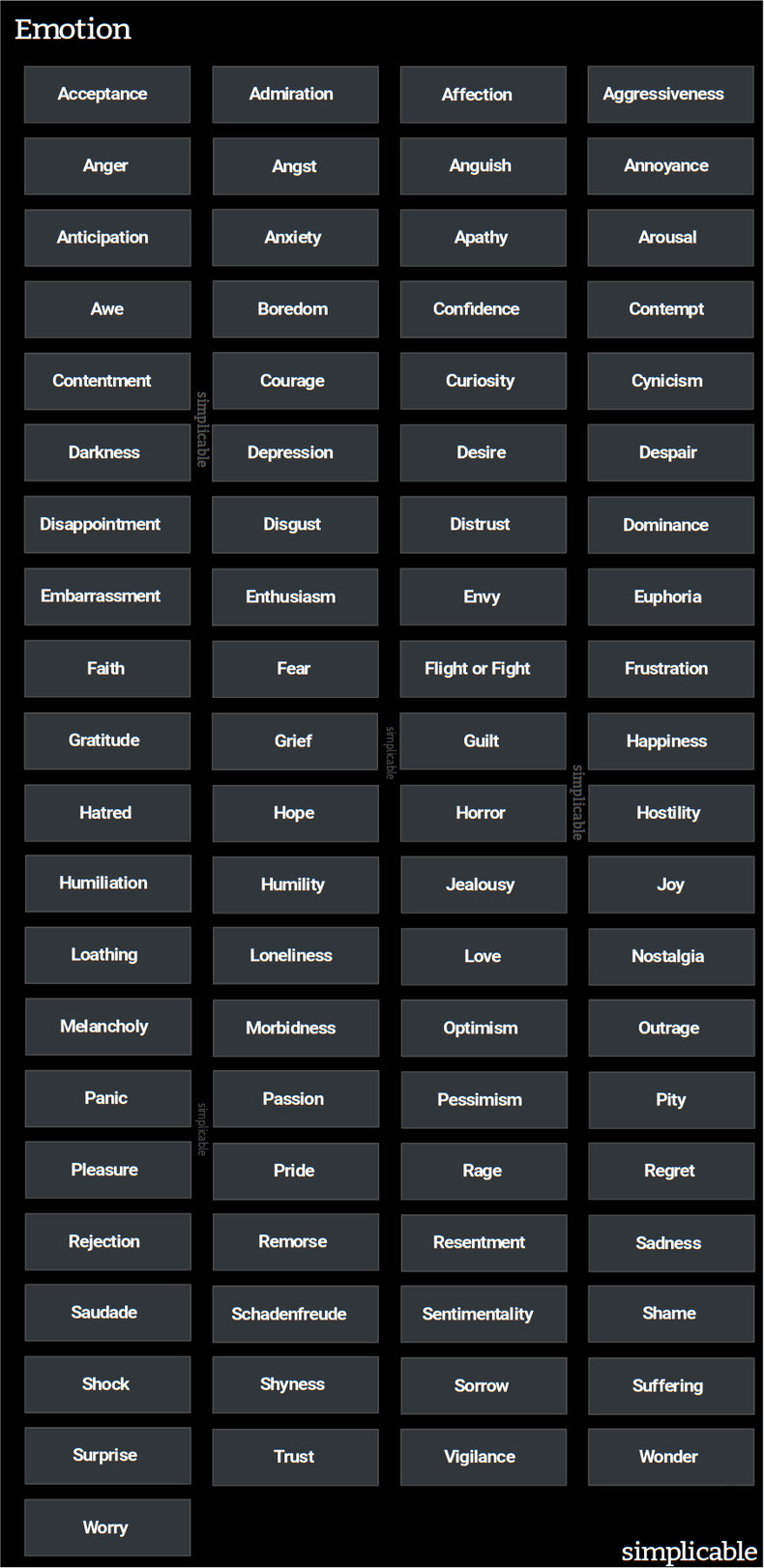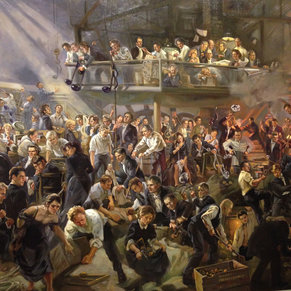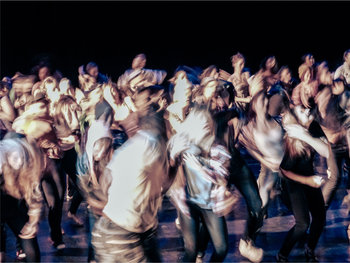

Acceptance
A feeling of neutrality or contentment with a situation.Admiration
Respect for someone or something.Affection
A feeling of caring and warmth.Aggressiveness
An intense desire to act towards some annoyance, problem or goal.Anger
A sense of indignation at perceived injustice and a desire to act negatively.Angst
Angst is anxiety related to deep philosophical questions such as the search for meaning.Anguish
Pain, distress and/or anxiety.Annoyance
Irritation at a distraction that is loud, boring, arrogant, idiotic or unfair.Anticipation
Feeling that you are waiting for something positive to happen.Anxiety
Worry, nervousness, unease or all three at the same time.Apathy
A relaxed state of emotional disengagement.Arousal
Feeling fully awake and engaged with your mind, senses and body.Awe
A feeling of great respect, amazement or wonder.Boredom
A state of being weary and restless due to a lack of stimulation. Boredom can also result from stimulation that is repetitive or meaningless to you.Confidence
A feeling of trust in yourself. Confidence can also apply to trust in another person or an entity such as a business.Contempt
A feeling that someone or something is worthless or bad.Contentment
A state of happiness or satisfaction with the state of things.Courage
Fearlessness in the face of risk.Curiosity
A desire to know something or experience something.Cynicism
Feeling pessimistic and suspicious.Darkness
A state of grief, fear, despair or immersion in the morbid and immoral.Depression
Feelings of severe sadness and loss of hope.Desire
The motivation to do something.Despair
The loss of hope.Disappointment
Displeasure at the nonfulfillment of hopes, desires or expectations.Disgust
A strong sense of disapproval directed at something you find wrong, unjust or unappealing.Distrust
The feeling that someone or something is dishonest or unreliable.Dominance
A feeling of superiority or power relative to another person.Embarrassment
A sense of awkwardness or shame.Enthusiasm
A high state of energy and interest.Envy
Resentfulness triggered by a desire for the abilities, social status, position or possessions of others.Euphoria
Intense feelings of well-being and joy.Faith
A state of complete and unconditional trust.Fear
Intense anticipation of risk often described as unpleasant and distracting.Flight or Fight
A sudden panicked fear that causes an urge to run or fight. A basic survival mechanism that generates a strong physiological response.Frustration
Anger or annoyance at a lack of progress.Gratitude
The state of being thankful and a desire to return kindness.Grief
Deep sorrow caused by loss.Guilt
A feeling of shame about your thoughts, actions or inactions.Happiness
An enthusiastic feeling of well-being and contentment.Hatred
Intense feelings of animosity, anger and resentment.Hope
Optimistic feelings about the future and the potential for positive outcomes.Horror
An intense feeling of shock, fear and disgust.Hostility
A desire to direct negative actions or inactions towards something or someone. For example, an desire to be unfriendly to someone for some perceived insult.Humiliation
A feeling of mortification, lowliness, submission or lost pride.Humility
A lack of self-obsession or feeling that you are a small part of far greater things. This is often viewed as a virtue and should not be confused with feelings of humiliation or low self-esteem.Jealousy
A feeling of insecurity about what you have or what you want. Jealousy is associated with intense resentment of people you view as competition, envy over their successes and fear about their strategy.Joy
A feeling of pure and guiltless happiness.Loathing
Intense disgust that borders on hatred.Loneliness
Sadness at a perceived lack of social interaction and connectedness.Love
A euphoric and total feeling of admiration and affection.Nostalgia
Nostalgia is a slightly sad but potentially enjoyable longing for the past.Melancholy
A mild sadness that has no cause or a superficial cause. For example, a slightly gloomy feeling due to bad weather.Morbidness
Unwholesome feelings related to death, disease and destruction.Optimism
Feelings of confidence and hope in the future.Outrage
A sense of shock and indignation at a perceived injustice.Panic
A sudden, urgent and intense feeling of fear.Passion
Intense desire and enthusiasm.Pessimism
A lack of confidence in the future.Pity
A feeling of sorrow and compassion for suffering. The term pity suggests that you feel superior in some way to those who are suffering.Pleasure
Satisfaction and enjoyment.Pride
A feeling of confidence in your self-worth. Pride can also apply to confidence in others such as pride in your nation, culture or family.Rage
A feeling of being both angry and out of control.Regret
Sadness, shame or disappointment regarding the past.Rejection
A feeling of hurt confidence due to being dismissed, excluded or refused.Remorse
Deep regret for a wrong you have done.Resentment
Bitterness at having been treated unfairly.Sadness
A painful feeling created by a sense of loss, helplessness or disappointment.Saudade
Melancholic longing for something you once had. This can be a romantic feeling that is enjoyable as opposed to a profound sadness.Schadenfreude
Schadenfreude is a dark sense of pleasure at the misfortune of others.Sentimentality
A state of excessive emotion that has not been earned. For example, being extremely sad about love songs as opposed to events in your life.Shame
A painful feeling created by negative evaluations of the self. This can include regret at your past behavior that you consider wrong or foolish. Shame can also be caused by your judgement that you are currently weak, immoral, powerless or worthless. Feelings of shame can cause a strong motivation to improve.Shock
A feeling of disorientation and confusion caused by an upsetting or surprising event.Shyness
A desire to avoid taking social risks.Sorrow
An intense sadness often related to loss, misfortune or regret.Suffering
A broad category of negative emotion caused by misfortune such as injury, illness, loss or hardship.Surprise
A sudden feeling of astonishment or wonder typically due to an unexpected event or realization.Trust
Firm belief and faith in someone or something.Vigilance
A heightened state of awareness and readiness for action.Wonder
A feeling of intense admiration for the inexplicable or astonishing.Worry
A state of concern about problems or risks.| Overview: Emotion | ||
Type | ||
Definition | An instinctual state of consciousness that is beyond verbal and visual thinking. | |
Related Concepts | ||


























